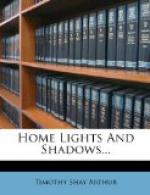Mrs. Andrews shook her head.
“In what does its sin consist?”
“It is an idle waste of time.”
“Can you say nothing worse of it?”
“I could, but delicacy keeps me silent.”
“Did you ever dance?”
“Me? What a question! No!”
“I have danced often. And, let me say, that your inference on the score of indelicacy is altogether an assumption.”
“Why everybody admits that.”
“Not by any means.”
“If the descriptions of some of the midnight balls and assemblies that I have heard, of the waltzing, and all that, be true, then nothing could be more indelicate,—nothing more injurious to the young and innocent.”
“All good things become evil in their perversions,” said the lady. “And I will readily agree with you, that dancing is perverted, and its use, as a means of social recreation, most sadly changed into what is injurious. The same may be said of church going.”
“You shock me,” said Mrs. Andrews. “Excuse me, but you are profane.”
“I trust not. For true religion—for the holy things of the church—I trust that I have the most profound reverence. But let me prove what I say, that even church going may become evil.”
“I am all attention,” said the incredulous Mrs. Andrews.
“You can bear plain speaking.”
“Me!” The church member looked surprised.
“Yes, you.”
“Certainly I can. But why do you ask?”
“To put you on your guard,—nothing more.”
“Don’t fear but what I can bear all the plain speaking you may venture upon. As to church going being evil, I am ready to prove the negative against any allegations you can advance. So speak on.”
After a slight pause, to collect her thoughts, the lady said:
“There has been a protracted meeting in Mr. B——’s church.”
“I know it. And a blessed time it was.”
“You attended?”
“Yes, every day; and greatly was my soul refreshed and strengthened.”
“Did you see Mrs. Eldridge there?”
“Mrs. Eldridge? No indeed, except on Sunday. She’s too worldly-minded for that.”
“She has a pew in your church.”
“Yes; and comes every Sunday morning because it is fashionable and respectable to go to church. As for her religion, it isn’t worth much and will hardly stand her at the last day.”
“Why Mrs. Andrews! You shock me! Have you seen into her heart? Do you know her purposes? Judge not, that ye be not judged, is the divine injunction.”
“A tree is known by its fruit,” said Mrs. Andrews, who felt the rebuke, and slightly colored.
“True; and by their fruits shall ye know them,” replied the lady. “But come, there are too many around us here for this earnest conversation. We will take a quarter of an hour to ourselves in one of the less crowded rooms. No one will observe our absence, and you will be freed from the annoyance of these dancers.”




